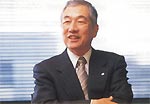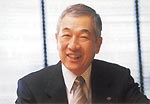|
| Q. Could you describe trends in the TA-Q-BIN
business during fiscal 2002, ended March 31, 2002? Although Yamato Transport Co., Ltd. faced intensifying competition in the Takuhaibin (door-to-door parcel delivery services) market, the number of parcels handled by the Company increased 5.5% from the previous fiscal year. In the business-to-consumer (B2C) field, we achieved particularly sharp growth in the mail-order business. The primary factors underpinning this favorable performance included the high acclaim for and increased use of our time-period delivery services for mail-order deliveries as well as overall growth in the mail-order market. While addressing the needs of the e-commerce market, we will cultivate demand from companies that are responding to needs in the business-to-business (B2B) market as well as upgrade such services as our settlement services in logistics. |
| Q. Can you tell us about market trends and the Company’s
business performance during the fiscal year under review? Amid a slump in both truck and air transportation, harsh conditions persisted in the business environment due to mounting competition, particularly in the area of price. Responding to these challenging conditions, the Yamato Transport Group focused on raising the quality of its existing products, such as TA-Q-BIN and Kuroneko Mail, while rebuilding its information system. The Company also concentrated on improving profitability by cultivating new customers and expanding its transactions in each business segment. These efforts yielded a 2.8% increase in consolidated operating revenues, to ¥932,120 million (US$7,008.4 million). Consolidated operating income edged up 2.2%, to ¥53,189 million (US$399.9 million). Although we recorded expenses for retirement benefits and expenses for rebuilding our information system, we succeeded in reducing various other expenses. As a result, net income for the fiscal year amounted to ¥27,512 million (US$ 206.9 million). President Q. Can you please provide us with a general description of the recently completed three year-plan? To ensure our place among the survivors in the highly competitive Takuhaibin market, since 1999 we have been implementing a three-year plan that places top priority on quality. By improving the quality of our services, we seek to achieve increases in the number of customers using our services and the number of packages handled. This will not only translate into growth in revenues but also enable higher pickup and delivery frequencies that will improve productivity per employee and lead to a corresponding decline in costs. In addition, raising quality will help reduce sorting and delivery errors while cutting freight-related accidents, all of which lead to wasteful costs. As illustrated by these examples, improving the quality of our services is ultimately linked to an increase in profits. As we work to achieve these goals, we are focusing on five guidelines: (1) developing products and services that stimulate new demand; (2) increasing levels of customer satisfaction (CS); (3) raising customer service levels; (4) installing advanced systems; and (5) upgrading employee education and training. Yamato Transport completed its three-year plan at the end of March 2002. Although several problems remain, the plan yielded continued increases in revenues over the past three years, and thus I believe the overall plan has been a success. I should point out that “creating quality” will be an ongoing theme at Yamato Transport, and I pledge that we will remain committed to developing new products and services as well as improving drivers’ responses to customers. |
   |
|
| Q. Could you tell us about your new three-year plan? Following our recently completed plan, we implemented our new three-year plan. The most noteworthy feature of this plan is that it covers the entire Yamato Transport Group, including all 53 companies and the approximately 110,000 employees that comprise the Group. The aim of this plan is to further enhance the appeal of Yamato Transport's businesses and focus on securing new business opportunities not only in the core truck transportation sector, but also in such areas as finance and information. As principal Group management targets, Yamato Transport will 1) promote the advancement of its information network built around the core functions of distribution, information, and settlement to create new value for society, and 2) aggressively undertake restructuring and solidify its management foundation without being bound by precedents or customs. Regarding goals for the final year of the plan, on a Groupwide basis we aim for consolidated operating revenues of ¥1,260,000 million, recurring income of ¥74,000 million, revenues from TA-Q-BIN services (based on number of parcels handled) of ¥740,000 million (corresponding to 1,050 million parcels), Kuroneko Mail services revenues of ¥80,000 million, moving services revenues of ¥70,000 million, and logistics and distribution processing revenues of ¥45,000 million. Q. Could you explain Yamato Transport's policies on capital expenditure, including IT investment? During the fiscal year under review, our capital expenditures were for increasing property, plant, and equipment, and the amount of these investments was approximately the same as in the previous fiscal year. The main buildings targeted by this investment were our Kita-Tokyo base terminal and Shin-Shizuoka base terminal. At our Kita-Tokyo base terminal, we installed sorting equipment for our Cool TA-Q-BIN service, while at our Shin-Shizuoka base terminal these investments were for consolidating sorting for traditional Cool TA-Q-BIN and TA-Q-BIN services-previously carried out in separate buildings-into one location. In addition, we introduced a new sorting system for Cool TA-Q-BIN, which has allowed us to achieve large improvements in work efficiency. In April 2002 we rebuilt our information system with the aim of eliminating problems with our backbone network. The investments for rebuilding this system will amount to approximately ¥60,000 million and will be divided among Yamato Transport, Yamato System Development Co., Ltd. (YSD), and other subsidiaries. Within a ten-year period, we will be strengthening our marketing network to help raise customer satisfaction, and plan to expand this system from 2,800 sales offices to 5,000 offices. Although this will result in an increase in first-time capital expenditures, our efforts to revise our personnel system and move toward a structure with numerous small-scale outlets should lower the ceiling of capital expenditures, allowing us to maintain our capital efficiency. We are thus working to improve efficiency by switching away from the use of high-rent buildings leased during the era of Japan's bubble economy to lower rent facilities in response to increased rental costs, as well as reducing the number of employee groups per outlet from multiple groups to one, reexamining our wage system and promoting shared use of in-house staff. Q. What is the outlook for the coming fiscal period? As I mentioned, in April we commenced our new three-year plan, under which we aim to improve the performance of the entire Yamato Transport Group. While continuing to base our operations on our greatest strength—the transport infrastructure and know-how as well as delivery quality of our TA-Q-BIN business—we aim to further enhance convenience for customers by rebuilding our information system and opening numerous small-scale sales outlets. As an additional measure, in April 2002 we implemented a new personnel system that should yield even higher performance by clarifying the responsibilities and authority of each employee and improving staff motivation. Another important task will be to bolster our corporate structure in areas such as our information and sorting systems. In working toward this objective, we will improve work efficiency by restructuring our framework for carrying out our businesses, sharpen cost competitiveness, as well as continue to reduce various costs. We would like to thank our shareholders for their continued support and understanding. |
|
August 2002 Keiji Aritomi President |